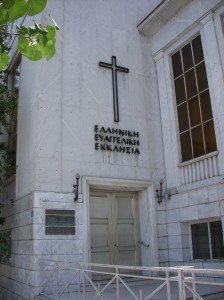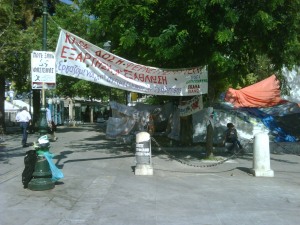One of the great privileges I have is to visit and see first-hand what God is doing in some of the world’s great cities. From time to time, I will ask the church planters that I am working with to pen a profile of their city and what God is doing there. Below is a profile of Athens, Greece, put together by one of the church planters there, Tim Coomar. Tim is co-founder of the Exarcheia Evangelical Church, located in one of the hardest neighborhoods in all of Europe in which to to plant, where anarchists, students, artists, and political activists reside. The following is his description of what God is doing. I hope it is an encouragement to you. (it’s a bit longer than normal, but it’s good stuff, Tim is a good writer, and there are lots of pictures.)
Church Planting Movement Dynamics in Athens- by Tim Coomar
The Vision Begins
The Greek Evangelical Church has always been a self-supporting and indigenous denomination, virtually from its inception in the mid-1850s. So while there has never been so much of an issue of external dependency, for a very long time there has been a desperate lack of vision. This is evidenced by the fact that the number of evangelical churches in Athens has remained completely static at 5 for decades, with a 6th church being founded a few years ago largely for reasons of expediency (virtually all its members were transfers from existing churches).
This overview comes from the perspective of the First Greek Evangelical Church of Athens (AEEE from now on), which since 2004 has been developing a vision which seeks to rectify this problem, initially within the scope of the ministry of one local church yet with the hope that others will catch the same vision.
Historically-speaking, this vision had a spur, a realisation, and a decision that finally led to a conviction that has grounded everything we have done since then.
The spur was the evangelistic outreach during the 2004 Olympic Games, a citywide effort, in which AEEE played a major role.  As we went out into the city, however, we began to realise more and more just how insular we had become as a church and how little we had been reaching out to the city. In the aftermath of the Games, we made a decision to transform AEEE into an outward-focussed church that sought to serve and bless the city with the Gospel of Jesus Christ. Once we had arrived at this decision, it was then only a small step to arrive at our final (and now settled) conviction that the primary and normative way we wished to go about this would be by focussing our efforts on church planting.
As we went out into the city, however, we began to realise more and more just how insular we had become as a church and how little we had been reaching out to the city. In the aftermath of the Games, we made a decision to transform AEEE into an outward-focussed church that sought to serve and bless the city with the Gospel of Jesus Christ. Once we had arrived at this decision, it was then only a small step to arrive at our final (and now settled) conviction that the primary and normative way we wished to go about this would be by focussing our efforts on church planting.
One thing that we realised quite early on was that while AEEE was already a well-established institution of 150 years which had resources and could do many things, as an institution it could never reach the whole city. In order to do so, it would need to foster a movement. Leaving behind the comfort of its traditions, the familiarity of its subculture and the safety of its four walls, it would have to send its faithful out into multiple neighbourhoods of the city, to meet the people where they were and to plant new congregations in those neighbourhoods that would consequently be better-placed to serve them and bring the Gospel directly to them in creative, spontaneous and organic ways. These new congregations would also need to be self-replicating in order to carry the vision forward and prevent it from dying out after the first generation.
It was towards the end of this vision-building process that we first came into contact with representatives from (what was then) Redeemer Church Planting Center, who were able to give us further direction regarding how to go about pursuing this vision. We are delighted to be part of the Redeemer City to City global network.
Goals
In the last two years, the vision has taken a more formal shape through the establishment of ‘Polis – Athens City Initiatives’, a foundation set up to coordinate all of the different projects and activities that come under the general umbrella of city initiatives based out of AEEE. The work of ‘Polis’ (http://polis.org.gr – website to be launched late June 2015) is now divided into four main areas:
1) Church Planting
2) Redemptive Presence
3) Cultural Engagement
4) Church Planting Catalyst Events and Training Labs
These four areas correspond to where we are focussing our efforts and resources as this is how we feel the work of AEEE will transformed from a few encouraging ministries to a true a city-wide movement and church planting network.
1 Church Planting and Leadership
While the vision for AEEE and its ministry in Athens was initially conceived by the Pastor of AEEE, Giotis Kantartzis, he could not take it forward on his own. A church planting movement requires church planters — lots of them. Fortunately, during this time there was a solitary intern, Alexandros Pipilios, working alongside Giotis (in a denomination which is quite unfamiliar with the practice of hiring interns, or any other full-time staff beyond the pastor for that matter). He was joined a year later by a second intern, Tim Coomar, and together they began to imbibe the vision for the city that Giotis was imparting to his congregation.
In the summer of 2008, plans for church planting began to take shape as Giotis officially invited Alexandros and Tim to participate in the vision by agreeing to plant a church together in Exarcheia, a key neighbourhood of downtown Athens (they would do this once they had returned from seminary). At the same time, he assembled a launch team for the first new congregation — a church ‘graft’ based in Glyfada, the key neighbourhood of the southern suburbs. This would be led by Giotis and some of the elders of AEEE until a suitable planter came along to relieve Giotis. Glyfada Church was launched in September 2009 and within four years was established with a stable and growing congregation.
In 2009, a third intern, Giorgos Tolias, had joined AEEE and when he returned from seminary in the summer of 2013, he and his wife and baby daughter relocated to Glyfada in order to take over from Giotis. In the two years he has been there, Glyfada has grown rapidly, with a weekly attendance reaching 80 on some Sundays (from an initial launch team of 30), it has been particularised and is now developing a vision for the southern suburbs, including tentative plans for a church plant in a nearby neighbourhood. In the past year it has also taken on two interns who are both excellent prospects as potential church planters.
In the meantime, Alexandros and Tim returned from seminary in the States (all three attended Westminster Theological Seminary, PA) and in the summer of 2011 relocated with their families to Exarcheia, a neighbourhood whose significance as both a symbol and a center of culture and activism is such that it exerts a disproportionate influence on the city compared to many others. After several months of learning the neighbourhood, making contacts and training an initial core group of 12, Exarcheia Church was launched in March 2013. Exarcheia Church now has a weekly attendance that is creeping over 30 and has been accepted – and even embraced – by a neighbourhood that is widely considered to be the most godless and anti-religious in Greece.
Over half of the makeup of the congregation are from non-believing or unchurched backgrounds and almost half the congregation live in the neighbourhood, with relocation in order to serve better the neighbourhood now part of the culture of the church. We are delighted that one of our initial core-group members (at the time a baby Christian) has now completed an internship at Exarcheia Church and within the next two years will head off to seminary in order to come back and plant a church. This coming year, we will have two more interns, one of whom had never attended a church before she joined us and the other a formerly dechurched believer who has really matured in the short time he has been with us.
In terms of other projects, there are two potential church plants in their pre-launch / exploratory phase (in the Kypseli and Neos Kosmos neighbourhoods), one new plant launched in the suburb of Agia Paraskevi in November 2014 (led jointly by Giotis and Alexandros for now) and one revitalisation, a reboot of the AEEE Sunday evening congregation (led jointly by Tim and Giorgos).
2 Redemptive Presence
Mercy ministry has always been a part of the church’s work in a city like Athens. However, we wanted our church members to acquire a constant redemptive presence amongst the needy rather than simply turning up for a weekly ministry.
Exarcheia Church is located in a neighbourhood which is already keenly attuned to the plight of the needy. As such, many of the things that a church might normally do, almost unthinkingly, like feeding the homeless, we were hesitant to do since the locals were already doing it and doing it better than we ever could. We waited and prayed for a way to be a true redemptive presence in the neighbourhood, meeting a need that no one else could. This opportunity arose through a Danish couple who were setting up an NGO to help unaccompanied minors from Afghanistan and who wanted to partner with a local church. There was nothing like this in the whole of Athens and the need was huge. We agreed to adopt the work and they moved to Exarcheia and became members of the plant. Today the NGO, ‘Faros’, has been running for over a year, is largely staffed by volunteers from Exarcheia Church and is winning plaudits from all over the city for the work it is doing amongst refugee minors.
There is a further project being set up in Kypseli along the lines of vocational training.
3 Cultural Engagement
Bringing the gospel into dialogue with the wider culture is something we seek to do both organically – through the work of each local church – and more strategically, through a public-facing forum. Imago Dei is an apologetics ministry set up to engage with modern realities within art, philosophy, academia and pop culture through the use of events and online materials. It is run by Giorgos Kalantzis, a member of AEEE and a PhD candidate in Philosophy.
4 Church Planting Catalyst Events and Training Labs
We know that even if we were to grow into a very large and successful church planting network, we would still never even come close to reaching the whole city. We are nurturing a culture of generosity towards other denominations such that when we find points of contact with our vision we might already be in a position to share our resources and swallow whatever pride might have prevented us from working together in the past. In January 2014 we held a one-day training event on church planting to which ministers and elders from both our denomination and others were invited.
At the same time, we know that it is crucial for the longer-term viability of this vision that more and more leaders are developed. To that end, funding was secured for the first two years of an ‘incubator’ programme — basically a year-long internship that involves teaching and training in the basic principles of church planting and theology alongside a placement one of the plants. We have just finished the first year of the programme and it has largely been a great success. There are at least five more young people lined up for next year’s programme.
Prayer
In all these efforts, the support of AEEE has been invaluable. While the congregation does not fully understand many of the new things that are taking place, they know that what is taking place is far beyond our own capabilities and even the most skeptical are at the same time the biggest supporters of the plants in prayer.
Insofar as we are able, we are reorganizing our congregations into evangelistic communities and, as such, we are aiming to make prayer one of the central and defining activities that drives our evangelism. Since evangelism is such a central part of the life of a plant, we feel all the more keenly how unsustainable true organic growth is without a supernatural work of the Holy Spirit to convert and spiritually form all the new people we are coming into contact with.
Are we building a movement? Yes and no. We believe that all the work we are doing is like building a fleet of ships… a great resource, but without the Holy Spirit to come like the wind and blow, those ships will remain motionless in the water. That is why we seek first and foremost your prayers.
 Walter III took a new job with Raymond James Financial Services and Steph continues to work at Cincinnati Children’s Hospital. They attend New City Presbyterian, one of North Cincinnati’s church plants. Walter IV turns 2 on January 24.
Walter III took a new job with Raymond James Financial Services and Steph continues to work at Cincinnati Children’s Hospital. They attend New City Presbyterian, one of North Cincinnati’s church plants. Walter IV turns 2 on January 24. They are beginning the process now of getting their house ready to sell. Garrett turned 4 on Dec. 6 and Peyton will be 2 on Jan. 22. Becky and I will be making more trips to Atlanta.
They are beginning the process now of getting their house ready to sell. Garrett turned 4 on Dec. 6 and Peyton will be 2 on Jan. 22. Becky and I will be making more trips to Atlanta. job, and have the privilege of traveling throughout Southern Europe and the U.S. , consulting with church planters and seeing where City to City can help encourage movements of the gospel in the great cities of the world.
job, and have the privilege of traveling throughout Southern Europe and the U.S. , consulting with church planters and seeing where City to City can help encourage movements of the gospel in the great cities of the world.

 to make an impact in the city for Christ.
to make an impact in the city for Christ.























